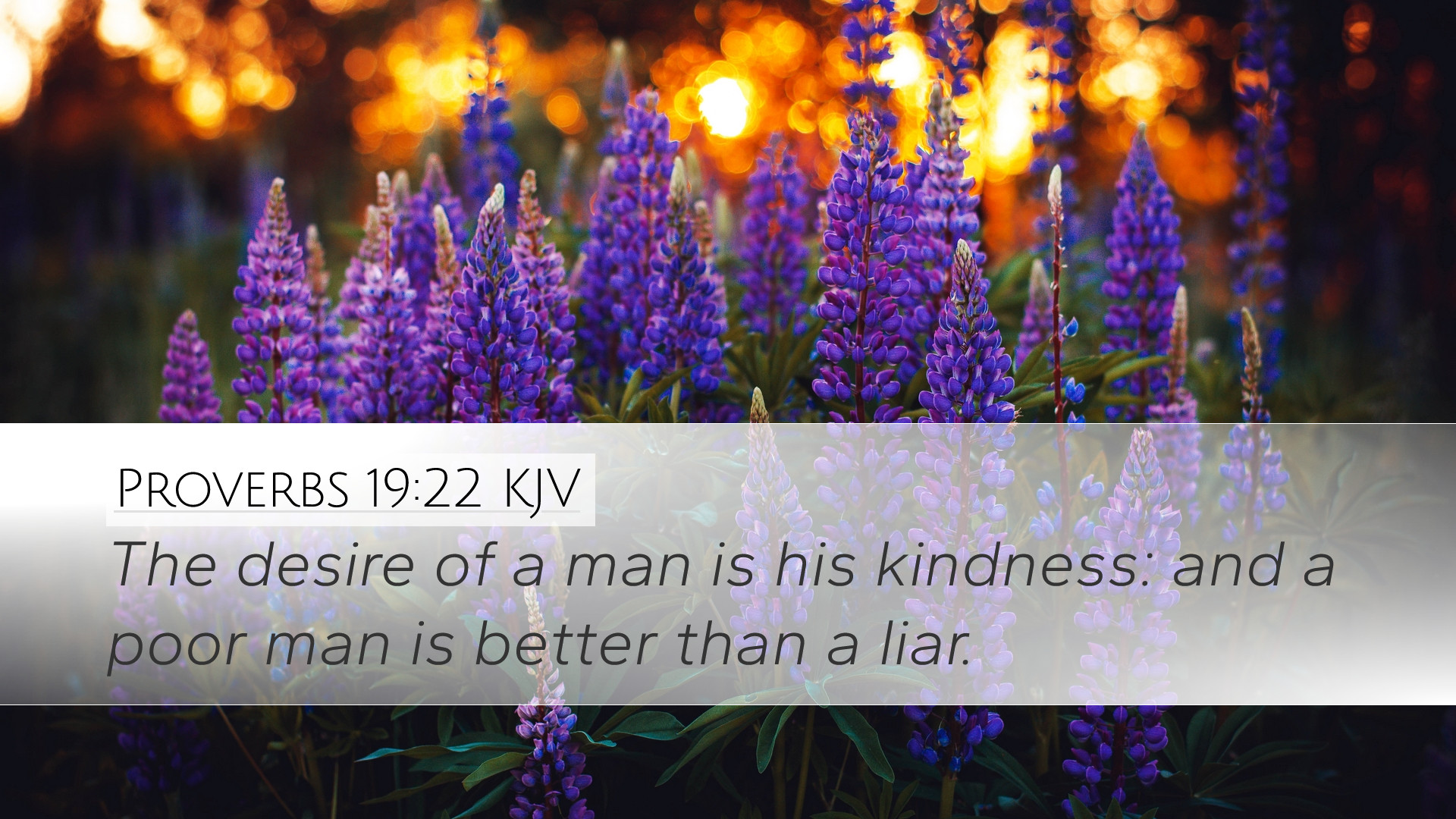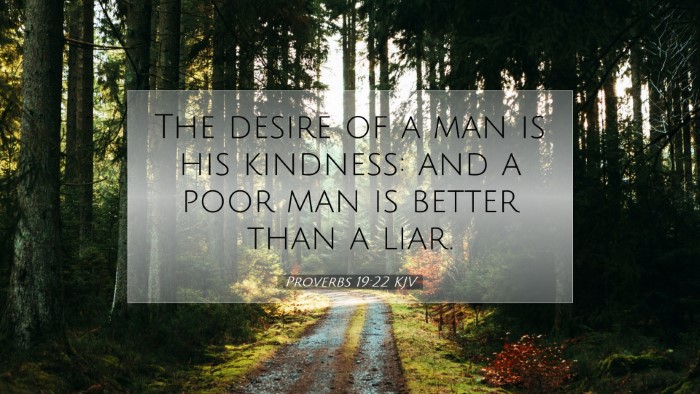Commentary on Proverbs 19:22
Proverbs 19:22 states, "What is desirable in a man is his kindness, and it is better to be a poor man than to be a liar." This verse emphasizes the virtues of kindness and truthfulness in contrast to the perils of deceit and worldly wealth. Below is a detailed examination of the text, incorporating insights from several notable public domain commentaries.
Overview of the Verse
This proverb encapsulates the moral character that is esteemed in society, focusing on the intrinsic values of kindness and honesty. It suggests that a person's true worth is not found in his material possessions, but rather in his character. Each component of this verse invites deeper reflection on the values that drive a meaningful life.
Insights from Matthew Henry
Matthew Henry highlights that the essence of this proverb is rooted in the kind-heartedness exhibited by individuals. He notes that kindness is a quality that reflects a person’s inner disposition and that it is far more valuable than selfish ambition or material wealth. He elaborates on the moral lesson that humility and kindness are desirable traits and that these virtues elevate a person's standing in the eyes of God and man.
Henry stresses that the mention of a 'poor man' serves to underscore an alternative to the common pursuit of wealth: that one should prioritize goodness over riches. The wisdom in this statement teaches that association with wealth is not equivalent to high virtue; instead, integrity and kindness define true character.
Insights from Albert Barnes
Albert Barnes delves into the significance of kindness as a virtue indicative of genuine character. He argues that kindness is fundamentally tied to honesty and integrity; without these qualities, one’s kindness may be viewed with skepticism. Barnes makes the case that kindness helps foster positive relationships and social harmony, thereby enriching the community.
Moreover, Barnes contrasts the notion of poverty with the vice of dishonesty. He asserts that being a 'poor man' is better than being a liar because a liar’s deception undermines trust and damages one’s moral standing. He concludes that the intrinsic value of a kind and honest character surpasses the ephemeral nature of wealth and societal accolades.
Insights from Adam Clarke
Adam Clarke provides a scholarly examination of the terms used in this verse and their implications for moral teaching. He remarks that "kindness" is indicative of a person’s virtue that directly influences interpersonal relations. Clarke emphasizes that a man’s fabled virtues, when devoid of kindness and truth, are worthless. His commentary elucidates the idea that genuine kindness can lead one to possess a significant social and spiritual influence, regardless of financial status.
Clarke also underscores the peril of deceit, observing that lying leads to broken relationships and societal discord. He cautions against valuing wealth attained through dishonest means, suggesting that such wealth carries with it deep moral bankruptcy. In contrast, he encourages seekers of integrity to aspire toward honesty and kindness as a foundation for enduring societal respect and esteem.
Theological Reflections
This verse invites pastors and scholars alike to meditate on the character of God as reflected in these virtues. The kindness attributed to God and His faithfulness in truth establishes a benchmark for believers. Just as God is merciful and truthful, so too should His followers embody these qualities in their daily lives.
- Divine Kindness: Reflecting on God's kindness encourages believers to approach others with compassion, regardless of their status in society.
- Integrity in Action: Like God, who cannot lie, Christians are called to uphold truth consistently, thus modeling His nature.
- Value of the Individual: This proverb hints that every individual possesses intrinsic worth, challenging societal metrics that equate value with material success.
Practical Applications
For pastors, students, and theologians, Proverbs 19:22 serves as a reminder of the qualities to cultivate and promote within congregations and communities:
- Preaching Kindness: Encourage practical expressions of kindness in church programs and among congregants, creating a community that reflects God's love.
- Promoting Integrity: Teach the importance of honesty in all dealings—both personal and professional—ensuring that integrity is held as a core value.
- Equipping the Poor: Develop outreach programs that assist the financially disadvantaged, emphasizing their dignity and worth created in God's image.
Conclusion
Proverbs 19:22 challenges believers to reevaluate the measures by which they assess worth. Kindness and truth are timeless virtues that transcend socio-economic boundaries, calling for a transformative approach in how one views themselves and others. In doing so, a faithful reflection of the character of God can be demonstrated, leading to stronger communities grounded in mutual respect and love.


